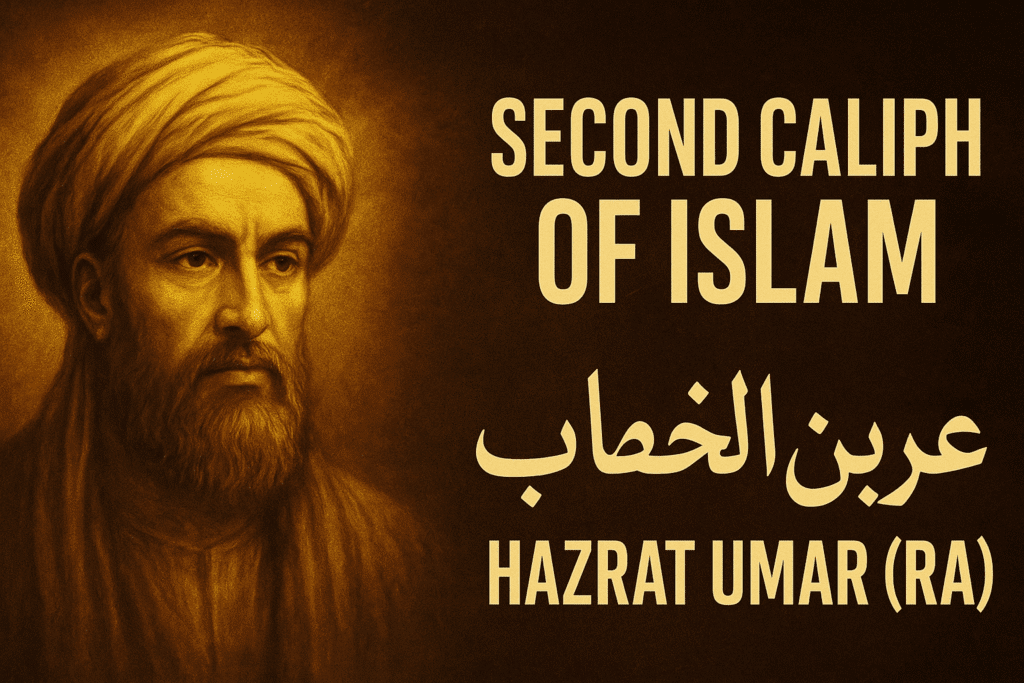
Table of Contents
Introduction
Hazrat Umar ibn al-Khattab (RA) was the second Caliph of Islam and one of the greatest companions of Prophet Muhammad ﷺ. Known as Al-Farooq (the one who distinguishes truth from falsehood), he was a man of justice, strength, and wisdom.
Under his leadership, the Islamic empire expanded rapidly, and his reforms shaped governance, law, and society in ways that still inspire the world today.
Early Life of Hazrat Umar (RA)
- Born in Makkah in the Quraysh tribe.
- Known for his intelligence, eloquence, and physical strength.
- Initially opposed Islam but later embraced it with full conviction.
Acceptance of Islam
- Converted to Islam after initially intending to harm the Prophet ﷺ.
- His conversion was a turning point that strengthened the Muslim community.
- Publicly declared his faith, giving courage to weaker Muslims.
Title of Al-Farooq
- Prophet Muhammad ﷺ gave him the title Al-Farooq.
- He distinguished right from wrong with courage and clarity.
Contributions as Caliph
Hazrat Umar (RA) became the second Caliph after Hazrat Abu Bakr (RA) and ruled for 10 years (634–644 CE).
Major Achievements
- Expansion of the Empire: Conquered Persia, Syria, Egypt, and parts of Byzantium.
- Judicial System: Established Qadis (judges) and courts.
- Bayt al-Mal (Treasury): Organized state finances.
- Public Welfare: Built canals, roads, and welfare systems for the poor.
- Hijri Calendar: Introduced the Islamic calendar.
- Security: Set up police and defense systems.
Character and Qualities
- Justice: Known for being fair and unbiased in judgment.
- Courage: Fearless in battle and leadership.
- Humility: Lived simply despite ruling a vast empire.
- Piety: Deeply devoted to prayer, fasting, and remembrance of Allah.
- Wisdom: A visionary leader with strong decision-making.
Family and Personal Life
- Simple lifestyle despite great power.
- Strongly avoided luxury.
- Known for checking public welfare himself at night, ensuring no one went hungry.
Death and Burial
- In 644 CE, Hazrat Umar (RA) was martyred during Fajr prayer by Abu Lu’lu’ Firuz ل.
- Buried next to Prophet Muhammad ﷺ and Hazrat Abu Bakr (RA) in Masjid al-Nabawi, Madinah.
Hadith About Hazrat Umar (RA)
Hazrat Umar (RA) is mentioned in hundreds of Hadith, highlighting his virtues and closeness to Prophet Muhammad ﷺ.
- Sahih al-Bukhari & Sahih Muslim: Contain numerous narrations about his wisdom and faith.
- Virtues Hadith: The Prophet ﷺ said: “If there were to be a Prophet after me, it would have been Umar.” (Tirmidhi)
- Influence in Revelation: Several Qur’anic verses were revealed confirming his opinions.
- Hadith Collections: Narrations about him can be found in Bukhari, Muslim, Abu Dawood, Tirmidhi, and Ibn Majah.
📌 Scholars mention more than 500 Hadith related to Hazrat Umar (RA) across the six authentic books (Sihah Sittah).
Experts & Scholars on Hazrat Umar (RA)
Classical Scholars
- Imam Bukhari & Imam Muslim (RA): Recorded many narrations on his virtues.
- Ibn Kathir (RA): Detailed his caliphate in Al-Bidaya wa’l-Nihaya.
- Imam al-Dhahabi (RA): Highlighted his justice in Siyar A‘lam al-Nubala.
Modern Scholars / Historians
- Dr. Ali Sallabi: Author of Umar ibn al-Khattab: His Life and Times.
- Shaykh Yasir Qadhi: Lectures on Umar’s leadership and reforms.
- William Montgomery Watt: Wrote about Umar’s administrative brilliance.
Lessons from Hazrat Umar (RA)
- Justice Above All – Fairness is the foundation of strong leadership.
- Humility in Power – Simplicity and service keep authority pure.
- Public Welfare – Caring for society is a duty of rulers.
- Strength with Faith – Courage comes from strong belief in Allah.
- Accountability – Leaders must answer to Allah for their people.
Legacy of Hazrat Umar (RA)
Hazrat Umar (RA) left behind a legacy of justice, governance, and leadership unmatched in history. His laws, reforms, and policies influenced both Islamic and world civilizations.
His life teaches Muslims to balance strength with mercy, justice with compassion, and power with humility.
Conclusion
The life of Hazrat Umar (RA) is a shining example of how faith can transform a person into a leader who changes the course of history. His fearless justice, devotion to Allah, and service to humanity make him one of the greatest figures in Islam.
By studying Hazrat Umar (RA), Muslims learn the importance of courage, fairness, and humility in every aspect of life.
Who was Hazrat Umar (RA)?
Hazrat Umar ibn al-Khattab (RA) was the second Caliph of Islam and one of the closest companions of Prophet Muhammad ﷺ. He is known for his justice, strength, and leadership.
Why was Hazrat Umar (RA) called Al-Farooq?
Prophet Muhammad ﷺ gave him the title Al-Farooq because he distinguished clearly between truth and falsehood.
What were the major achievements of Hazrat Umar (RA) as Caliph?
His achievements include the expansion of the Islamic empire, establishment of a judicial system, creation of the Islamic calendar, organization of the treasury, and public welfare reforms.
How many Hadith mention Hazrat Umar (RA)?
Hazrat Umar (RA) is mentioned in over 500 Hadith across authentic collections like Sahih al-Bukhari, Sahih Muslim, Abu Dawood, Tirmidhi, and Ibn Majah